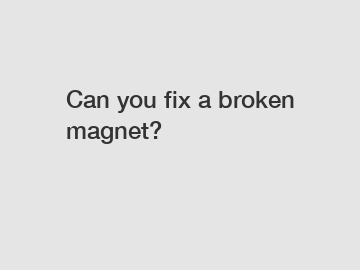Can you fix a broken magnet?
Magnets are an essential part of our daily lives. From holding up important notes on the refrigerator to powering the speakers in our devices, magnets play a crucial role in numerous applications. However, like any other object, magnets are not immune to damage or wear and tear. So, what do you do when your magnet breaks?
The good news is that in many cases, a broken magnet can be fixed. The process of fixing a broken magnet depends on the type of magnet and the extent of the damage. In this blog post, we will discuss different types of magnets, common reasons why they break, and how you can potentially fix a broken magnet.
Types of Magnets:

There are various types of magnets, each with its unique magnetic properties. The most common types of magnets are:
1. Permanent Magnets: These are the most commonly used magnets and include materials such as neodymium, samarium cobalt, and ferrite. Permanent magnets retain their magnetism even after being removed from an external magnetic field.
2. Temporary Magnets: These are magnets that only exhibit magnetic properties when exposed to an external magnetic field. Common examples include electromagnets and soft magnets.
3. Rare Earth Magnets: These are strong magnets made from rare earth elements like neodymium, dysprosium, and praseodymium. They are known for their exceptional magnetic properties.
Common Reasons Why Magnets Break:
There are several reasons why magnets may break or lose their magnetic properties. Some common reasons include:
1. Physical damage: Dropping a magnet or subjecting it to excessive force can cause it to break or crack.
2. Exposure to high temperatures: Heat can demagnetize magnets and cause them to lose their magnetic properties.
3. Corrosion: Exposure to moisture or corrosive substances can damage the surface of the magnet and weaken its magnetic field.
4. Improper handling: Mishandling magnets or storing them incorrectly can lead to damage over time.
Fixing a Broken Magnet:
If you have a broken magnet, there are a few ways you can potentially fix it depending on the type of magnet and the extent of the damage. Here are some tips to help you fix a broken magnet:
1. Gluing: If your magnet has broken into two pieces, you can try to glue them back together using a strong epoxy adhesive. Make sure to clean the surfaces of the magnet before applying the glue and hold the pieces together until the adhesive sets.
2. Re-magnetizing: In some cases, a magnet may lose its magnetic properties due to exposure to heat or physical damage. You can try re-magnetizing the magnet using a strong external magnetic field. Place the magnet near a powerful magnet or electromagnet to help restore its magnetic properties.
3. Polishing: If the surface of the magnet is damaged or corroded, you can try polishing it using a gentle abrasive like fine sandpaper or a polishing compound. This can help remove any surface imperfections and restore the magnet's magnetic field.
4. Replacement: If the magnet is severely damaged or cannot be fixed, you may need to replace it with a new one. Make sure to choose a magnet with similar magnetic properties to ensure it functions properly in its intended application.
Remember, it is essential to handle magnets with care to prevent damage and preserve their magnetic properties. Store magnets away from high temperatures, moisture, and corrosive substances to ensure they remain in good condition.
In conclusion, while a broken magnet may seem like a significant problem, it is often possible to fix it with the right tools and techniques. By understanding the type of magnet you have, the reasons for its breakage, and how to potentially fix it, you can extend the lifespan of your magnets and continue to enjoy their magnetic properties in various applications. So, the next time you encounter a broken magnet, don't despair – with a bit of creativity and know-how, you may be able to fix it and restore its magnetic magic.
Contact us to discuss your requirements of Exact Positioning Shuttering Magnet, Neodymium Laminated Magnet Factory, Magnetic Steel Triangle Chamfer. Our experienced sales team can help you identify the options that best suit your needs.


